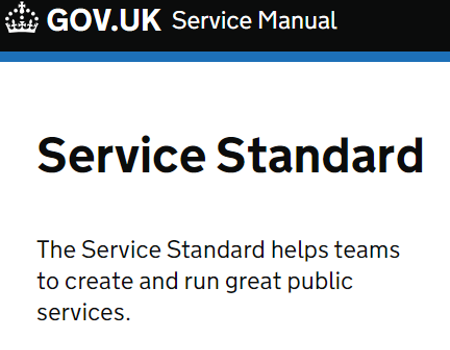Investigating the Service Standard
The start of our work on offering consistent and even better digital services

As part of the council's work to ensure we offer consistent and even better digital services, we've been looking at how we might apply a common standard across the organisation.
The Service Standard and particularly its adoption by local authorities is a topic that has inspired a lot of discourse among digital practitioners in local government recently, asking questions such as:
- Is the standard feasible for local authorities?
- Do we need to work towards creating our own?
- Why are we even having this conversation?
If you're reading this then it's more likely than not that you already have a fair understanding of this standard and the conversations surrounding it.
As part of understanding whether the standard is applicable to a local authority, I am researching its use within our organisation, and the research is currently ongoing, but it looks something like this
Methodology
I am going with a qualitative approach because it allows me to have an in depth understanding of people's approach to the Service Standard and to standards in general for their digital services. So far, I've been able to have some interesting conversations with people that work in different teams across the council and this has provided me with insight on the nuances in how these different teams work and their differences and similarities.
This kind of data is important because if we're going to adopt a standard at the council, we need to understand our processes on a more granular level. Local authorities differ in how they operate and the kinds of customers they serve and even within these authorities, differences occur across the various teams.
I have been conducting interviews via Teams with some of our core departments, like Development and Planning, Revenues and Benefits, Culture, etc. I've also conducted one in person group interview with my own team, Digital Services.
Following these interviews, I will begin analysing the transcripts using reflexive Thematic Analysis, as suggested by Braun and Clarke. I have decided to go for Thematic Analysis versus other methods of qual analysis (e.g. content analysis, grounded theory) because it provides the researcher (me in this case) with a level of flexibility. It is also the best fit for approaching my overarching research question:
How do different teams at West Berkshire Council establish a standard for their digital services?
Additionally, while we probably all have general ideas of the problems associated with adopting the standard, I do not want to limit my analysis by approaching my data with preconceived theories as I believe there is potential to draw out a solution to this impasse from the data directly (with some finetuning of course).
If you want to read more about thematic analysis, here's a resource that breaks it down quite nicely: Reflecting on reflexive thematic analysis.
If you are extra keen on knowing more about it, you can also have a look at this book by Braun & Clark: Successful Qualitative Research: a practical guide for beginners.
Possible Outcome & Next Steps
As I mentioned earlier, there is a lot of interest in the Service Standard and its adoption but so far, I have not come across any structured studies around this topic. I may be totally wrong and of course it is possible that the studies just have not been published but nonetheless I believe conducting formal research on this is a valuable addition to the larger body of knowledge we currently have.
I am currently working with the Local Government Association (LGA) on organising a series of workshops, with at least one in-person to discuss the possible ways forward.
This will be guided by my research results as well as the results from this recently published survey created by LocalGov Digital and the LGA (you should really check this out). The aim of these workshops is to collaborate with like minds to really contextualise all these conversations we've been having about the Service Standard and move forward with practical ways to make it adaptable for local authorities.





There are no comments
Add a comment